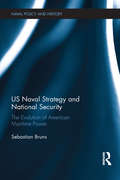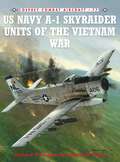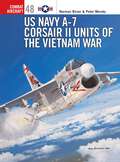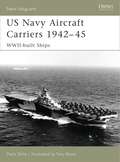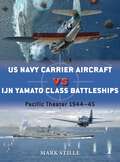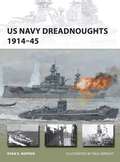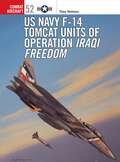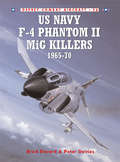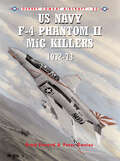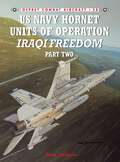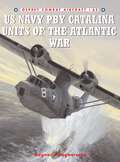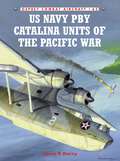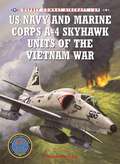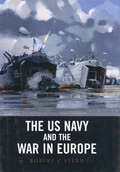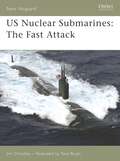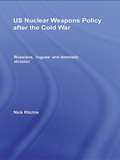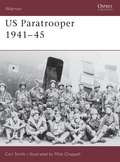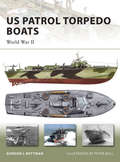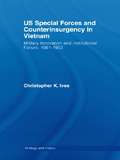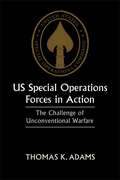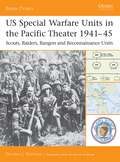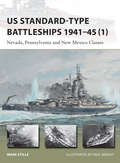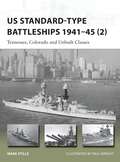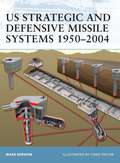- Table View
- List View
US Naval Strategy and National Security: The Evolution of American Maritime Power (Cass Series: Naval Policy and History)
by Sebastian BrunsThis book examines US naval strategy and the role of American seapower over three decades, from the late 20th century to the early 21st century. This study uses the concept of seapower as a framework to explain the military and political application of sea power and naval force for the United States of America. It addresses the context in which strategy, and in particular US naval strategy and naval power, evolves and how US naval strategy was developed and framed in the international and national security contexts. It explains what drove and what constrained US naval strategy and examines selected instances where American sea power was directed in support of US defense and security policy ends – and whether that could be tied to what a given strategy proposed. The work utilizes naval capstone documents in the framework of broader maritime conceptual and geopolitical thinking, and discusses whether these documents had lasting influences in the strategic mind-set, the force structure, and other areas of American sea power. Overall, this work provides a deeper understanding of the crafting of US naval strategy since the final decade of the Cold War, its contextual and structural framework setting, and its application. To that end, the work bridges the gap between the thinking of American naval officers and planners on the one hand and academic analyses of Navy strategy on the other hand. It also presents the trends in the use of naval force for foreign policy objectives and into strategy-making in the American policy context. This book will be of much interest to students of naval power, maritime strategy, US national security and international relations in general.
US Navy A-1 Skyraider Units of the Vietnam War
by Jim Laurier Rick Burgess Zip RausaOsprey's examination of the A-1 Skyraider Units' participation in the Vietnam War (1955-1975). Designed and built as a carrier-based attack aircraft in 1944, the A-1 reached frontline units too late to see combat in World War II (1939-1945). With the advent of jets in the late 1940s, the Skyraider was seen as a dated throwback to the golden age of piston-engined naval aviation. Despite its days seemingly numbered, the A-1 proved to be a huge success in the Korean War. Remaining in production through to 1957, some 3,180 Skyraiders had been built by the time the last one left the Douglas plant. Nicknamed the ''flying dump truck'', the A-1 remained a key component in naval air wings into the 1960s, allowing the aircraft to play its part in the escalating conflict in Vietnam. Both A-1 attack and EA-1F airborne early warning aircraft saw action in Southeast Asia from 1960 through to 1969, when the last examples were finally retired from carrier decks. The A-1s in particular bombed targets in both North and South Vietnam, despite the aircraft being highly vulnerable to enemy flak and fighters. Co-written by a two-tour Vietnam War combat veteran in the A-1, this is the first book that focuses exclusively on the aircraft's service in Vietnam, providing a must-have volume for Vietnam aviation enthusiasts.
US Navy A-7 Corsair II Units of the Vietnam War
by Peter MerskyOsprey's examination of A-7 Corsair II Units of the Vietnam War (1955-1975). Arriving on station with the USS Ranger (CVA-61) in early December 1967, the first Corsair II squadron became operational immediatedly and sustained its first combat loss three weeks later. This book tells how the A-7 soon proved its worth supporting ground operations in South Vietnam. As it continued to serve in the ground support role, the navy swiftly introduced the A-7E which soon ran into difficulties with supply lines - perhaps on account of what many perceived to have been a rushed introduction to service. Once these teething problems were resolved, the A-7E became the primary air-to-ground aircraft of the fleet.
US Navy Aircraft Carriers 1942-45
by Tony Bryan Mark StilleDominating the seas during World War II, the US aircraft carrier played a crucial role in every major naval combat of the war. Development of the Essex class began in 1941, and was the largest class of carrier ever built. During the Pacific War it formed the backbone of any fighting force and became renowned for its mighty 'Sunday Punch' - the impressive offensive power of 36 fighter planes, 36 dive bombers, and 18 torpedo planes.The Independence class was a lighter and faster carrier, built after Pearl Harbor, to bring more ships into action as quickly as possible. Alongside the Essex class their crews saw a dramatic change in tactical deployment as they began to form the fast carrier task forces that were so effective in Pacific operations.Featuring an annotated cutaway and artwork detailing both the interior and exterior features of the ships, this book explores the design, development, and deployment of both the Essex and Independence class of light carriers. This sequel to US Navy Aircraft Carriers 1922-45: Prewar classes (New Vanguard 114), provides a detailed exploration of the carriers that were at the forefront of many actions in World War II, including the climatic battles of Phillipine Sea and Leyte Gulf in 1944.
US Navy Carrier Aircraft vs IJN Yamato Class Battleships
by Jim Laurier Mark StilleAs the Pacific War approached a crescendo, the clashes between swarming US Navy carrier aircraft, and the gigantic Imperial Japanese Navy (IJN) Yamato-class battleships became symbolic of the fortunes of the two nations. They also served as a metaphor for the profound changes in naval technology and doctrine that the war had brought about. The two opposing forces were the most powerful of their kind - the Japanese Yamato and Musashi were the biggest most heavily armored and armed battleships ever built, while US carrier aviation had evolved into a well-oiled, war-winning machine. With detailed analysis of the technical features of the opposing war machines and a gripping account of the fighting itself, this vividly illustrated work presents views from the cockpits of US Navy Divebombers, and down the sights of IJN anti-aircraft guns, during two of the most dramatic naval engagements ever fought. After proving at Pearl Harbor that even the mightiest battleships were vulnerable to air attack, the Japanese would be forced to re-learn the lesson as the American Helldiver and Avenger bomber crews battered and eventually sunk the last remaining jewels of the Imperial Japanese Navy. Never again would a surface fleet be the dominant power at sea.
US Navy Dreadnoughts 1914-45
by Paul Wright Ryan NoppenWhen the United States went to war with Spain in April 1898, few European observers believed the small and relatively inexperienced American navy could achieve a decisive naval victory over an established European colonial power. In less than five months however, two Spanish naval squadrons lay at the bottom of the seas and the once great Spanish Empire ceded its last colonies in Asia and the New World to the upstart Americans. Admiral George Dewey, victor at the battle of Manila Bay, became a demigod in the eyes of the American media and public overnight and the excitement of new conquests overseas breathed new life into the traditional American expansionist doctrine of Manifest Destiny. The American naval hubris that developed in the wake of the Spanish-American War in reality rested on only a handful of modern battleships in a navy that was an obsolescent coastal defense force only ten years before. No one understood this better than Theodore Roosevelt. An expansionist who fought with distinction during the war with Spain and an advocate of the sea power theories of Captain Alfred Thayer Mahan, Roosevelt knew the present American navy was not strong enough to defend American shores against the larger navies of Europe let alone those of a new empire. European powers still skirted the Monroe Doctrine as evidenced by the British-German-Italian blockade of Venezuela from 1902-03 and the Dutch FI Venezuela War of 1908, and the United States was increasingly threatened in the Philippines, Samoa, and the Caroline and Marshall Islands by the imperial ambitions of Germany and Japan. To remedy the lack of naval preparedness for America's sudden emergence as a world power, Roosevelt and the United States embarked on rapid naval building program. To emphasize America's growing naval prowess and to demonstrate his "speak softly and carry a big stick" approach to foreign policy, Roosevelt sent the Great White Fleet, a squadron composed of sixteen battleships (all commissioned after 1898), to circumnavigate the globe, a great technical and logistical feat for the time. As impressive as the spectacle of the Great White Fleet was, all of the ships in it were quickly being rendered obsolescent by the dreadnought-type battleships coming into service in Great Britain and Germany. This did not catch the United States off-guard however for as the Great White Fleet was completing its world cruise, the USS South Carolina, America's first dreadnought whose design pre-dated that of HMS Dreadnought, was already fitting out. By the beginning of World War I, the United States possessed the third largest navy in the world and had ten dreadnoughts in service with four more under construction.
US Navy F-14 Tomcat Units of Operation Iraqi Freedom
by Jim Laurier Tony HolmesSince the limited Desert Fox campaign against Iraq in December 1998, the Tomcat has been integral to virtually all combat operations involving the US Navy in the Arabian Gulf. Indeed, on every carrier deployment to the Persian Gulf since Desert Fox, the F-14 unit(s) on station has ventured into 'The Sand Box' over southern Iraq and prosecuted targets operating in contravention to United Nations security council resolutions. This book covers the F-14 Operation Iraqi Freedom (2003-present) actions against battlefield targets and integrated air defence sites, command and control centres, regime leadership targets and military installations in Baghdad, Tikrit, Mosul and Kirkuk.
US Navy F-4 Phantom II MiG Killers 1965-70
by Jim Laurier Brad ElwardFor every American fighter pilot involved in the Vietnam War (1955-1975), the ultimate goal was to 'kill a MiG'. In eight years of conflict 43 Vietnamese Peoples Air Force aircraft were claimed by US Navy and US Marine Corps Phantom II crews, and one single ace crew produced. Navy Phantom IIs scored the first kills of the Vietnam War, in April 1965, as well as scoring the last in January 1973. This volume charts the successes of the navy fighter crews as they encountered 'MiGs, Missiles and AAA' over the jungles of North Vietnam.
US Navy F-4 Phantom II MiG Killers 1972-73
by Jim Laurier Brad ElwardThe second of two books on the Navy's Phantom II MiG killers of the Vietnam War (1955-1975), this book covers the numerous actions fought out over North Vietnam during the Linebacker I and II operations of 1972-73. No fewer than 17 MiGs were downed during this period, five of them by the Navy's sole aces of the conflict, Lts Randy Cunningham and Willie Driscoll of VF-96. Drawing on primary sources such as surviving Phantom II aircrew and official navy documentation, the author has assembled the most precise appraisal of fighter operations involving US Navy Phantom II units and those elusive MiGs ever seen in print.
US Navy Hornet Units of Operation Iraqi Freedom (Part One)
by Tony Holmes Chris DaveyThe first installment examining the US Hornet Units' participation in Operation Iraqi Freedom (2003-present). The F/A-18 Hornet in its various guises was the 'universal soldier' of OIF, with around 250 seeing combat. Flown by various squadrons and groups, the Hornet attacked a range of targets including tanks of the various Iraqi Republican Guard units and government buildings housing elements of the Baath party regime. Apart from its ability to drop precision munitions such as laser-guided bombs, the Hornet was also capable of launching anti-radar missiles and acting as an aerial tanker and reconnaissance platform for other strike types. This book explores the Hornet's versatility which has enhanced its reputation as one of the world's leading strike-fighter aircraft.
US Navy PBY Catalina Units of the Atlantic War
by Jim Laurier Ragnar RagnarssonSeveral books have been written about US naval air patrol operations in World War II (1939-1945), but none do full justice to the role played by patrol squadrons of the US Navy in the longest, most bitterly fought campaign of the war, the Battle of the Atlantic. From the Arctic to the Equator, anti-submarine aircraft of the US Navy patrolled both sides of the stormy Atlantic alongside their Allied counterparts. They escorted merchant convoys through the submarine-infested waters, protecting the crucial lifeline from the United States to Great Britain and the Mediterranean that carried troops and supplies for the ultimate liberation of North Africa and Europe. The PBY Catalina, in which most of these vital missions were flown, was the most successful flying boat ever designed. Built in greater numbers than any other, it served the maritime air forces of all principle Allied nations, as well as the four branches of the US military. Except for a handful of Martin PBM Mariners, the Catalina was the only long range patrol bomber in the US Navy's inventory when the USA entered World War II. Though considered obsolete in 1939, it served in significant numbers until war's end and for many years after. Its total contribution to victory can only be surmised and the number of ships and lives saved by the PBY's mere presence over convoys will never be known. However, US Navy PBYs sank 19 Axis submarines, all identified by the author from contemporary evidence. Photographs of the Catalina in service in the Atlantic are rare but the author has assembled over 80 through research in official archives and private collections.Related TitlesPV Ventura/Harpoon Units of World War II (Combat)Kriegsmarine U-boats 1939-45 (New Vanguard)Sunderland Squadrons of World War II (Combat)
US Navy PBY Catalina Units of the Pacific War
by Jim Laurier Louis DornyAlthough designed in the mid-1930s and in squadron service several years prior to the Pearl Harbor attack, the PBY Catalina proved its soundness in combat throughout the four years that World War II raged across the Pacific. Deadly in its primary role as a submarine hunter, the PBY was the scourge of the Imperial Japanese Navy's submarine force. Its amphibious traits also made the aircraft well suited to air-sea rescue, and thousands of Allied airmen were saved from a watery grave by PBY crews. Using personal interviews, war diaries and combat reports combined with original Japanese records and books, Louis B Dorny provides a view on the role of the Catalina from both sides of the war. Illustrated with over 80 photographs and color profiles detailing aircraft markings, this is the definitive history of and insight into the PBY's use by the US Navy and Allied forces in the Pacific during World War II (1939-1945).
US Navy SEALs
by Mir Bahmanyar Michael WelplyAfter the United States' failures in special operations missions during the late 1970s and 1980, a decision was made to revamp its unconventional military capabilities. The subsequent reorganization and redesignation in 1983 created the SEALs as they are known today, and later the all-encompassing command for US special operations forces under which they operate. Since then, these Navy Special Warfare (NSW) forces have operated in Grenada, the Persian Gulf, Panama, Somalia, Bosnia, Haiti, and Liberia. NSW units have also participated in the ongoing missions of Operation Enduring Freedom in Afghanistan and Operation Iraqi Freedom in Iraq. This book looks at the history, organization, training, uniforms, equipment and missions of the US Navy SEALs since their redesignation until the recent conflict in the Gulf.
US Navy and Marine Corps A-4 Skyhawk Units of the Vietnam War 1963-1973
by Jim Laurier Peter MerskySeeing considerable combat in the nearly 50 years since its service introduction, the Skyhawk was involved in the Vietnam War (1955-1975) from the very beginning. Navy and Marine Corps A-4s quickly established a presence in Southeast Asia, flying from aircraft carriers and land bases in South Vietnam in thousands of sorties against the entrenched communist forces from Hanoi to the communist supply lines along the Ho Chi Minh Trail. This book includes details of missions including the siege of Khe Sanh, Lam Son and the contentious invasion of Laos and Cambodia in 1971 and gives a fascinating account of the variety of missions pilots were asked to perform. These operations were not without risk, and large numbers of A-4s were shot down and their pilots killed or, like Edward Alvarez, imprisoned as POWs for up to eight years in appalling conditions.Officially endorsed by the Skyhawk Association and including first-hand accounts from veteran pilots who flew one of the greatest attack aircraft ever, Peter Mersky provides an insightful account of some of the most thrilling aerial combat missions that took place during Vietnam and the pilots who flew them. The first book to focus on the A-4's Vietnam service, this title is supported by previously unpublished colour and black and white photographs with 30 detailed colour profiles.
US Navy and the War in Europe
by Robert C. SternAlthough the defeat of Japan was the US Navys greatest contribution to the Second World War, it also played a significant role in the battle against Hitler. Even before Germany declared war in 1941, US naval vessels were actively engaged in Atlantic convoy battles, and suffered their first casualties long before the Pearl Harbor attack formally pitched America into the conflict. Thereafter the US Navy immediately sent reinforcements to the over-stretched Royal Navy, taking part in attacks on German-occupied Norway, flying aircraft to Malta and Egypt from its carriers and adding protection to the convoys to Russia. Its involvement in the crucial Battle of the Atlantic was also substantial, and the invasions of North Africa and Europe from 1942 onwards would have been unthinkable without the massive US forces. As late as 1945 the crossing of the Rhine by the Allied armies was heavily dependent on US Navy assets and expertise.It is not surprising that the Pacific campaign should have received so much attention from naval historians, but as a result the European effort has been undervalued and largely side-lined. This book is intended to redress the balance not just to chronicle the many little-known US operations in the Atlantic, Arctic and Mediterranean, but to reach a more rounded judgment of the US Navys contribution to victory in Europe.
US Nuclear Submarines: The Fast Attack
by Tony Bryan Jim Christley"Silent but deadly" - Osprey's US Nuclear Submarines: The Fast-Attack takes a fresh look at the controversial design and development of the nuclear submarine of which the United States Navy operates the largest fleet in the world. The advent of nuclear power transformed the submarine from a slow underwater vessel, incapable of staying submerged for long periods, into a weapon of stealth and endurance. Jim Christley, a former submariner, uses his own experience of serving aboard these vessels, and a wealth of technical information, to explore the many engineering issues and trade-offs, as well as the high risks of running a nuclear reactor at sea, which have dominated the intriguing story of the US nuclear submarine.
US Nuclear Weapons Policy After the Cold War: Russians, 'Rogues' and Domestic Division (Routledge Global Security Studies)
by Nick RitchieThis book offers an in-depth examination of America‘s nuclear weapons policy since the end of the Cold War. Exploring nuclear forces structure, arms control, regional planning and the weapons production complex, the volume identifies competing sets of ideas about nuclear weapons and domestic political constraints on major shifts in policy. It provi
US Paratrooper 1941-45
by Carl SmithIn Sicily, Normandy, and in the frozen hills of the Ardennes, America's airborne warriors proved themselves some of the toughest and most determined soldiers of World War II (1939-1945). What made these soldiers so special? How were they recruited, how did they learn to jump and fight? What special tactics and equipment did they use? This title looks at what it was like to be one of the United States' airborne elite, through the experiences of the soldiers themselves. It is the story of the men who invariably led the way; the soldiers who flew to battle and walked home.
US Patrol Torpedo Boats
by Peter Bull Gordon RottmanMotor torpedo boat development began in the early 1900s and the vessels were first put into active service during World War I. However, it was not until the late 1930s that the US Navy commenced the development of their Patrol Torpedo or PT boat program. The PT boat, or the "mosquito boat" as they were sometimes known, was originally envisioned for attacking larger warships with torpedoes using its "stealth" ability, high-speed, and small size to launch and survive these attacks. However, they were actually employed more frequently in a wide variety of other missions, many which were unforeseen by developers and planners, including rescuing General MacArthur and his entourage from the Philippines. Often taking on larger and better armed enemies these craft became famous for punching above their weight and were firmly thrust into the limelight by John F. Kennedy who while serving as a lieutenant on a PT-109 in the Pacific Theater heroically saved his fellow crew members winning him the Navy and Marine Corps Medal. This book examines the design and development of these unique craft, very few of which survive today and goes on to examine their role and combat deployment in both World Wars.From the Trade Paperback edition.
US Special Forces and Counterinsurgency in Vietnam: Military Innovation and Institutional Failure, 1961-63 (Strategy and History)
by Christopher K. IvesThis volume examines US Army Special Forces efforts to mobilize and train indigenous minorities in Vietnam. Christopher K. Ives shows how before the Second Indochina War, the Republic of Vietnam had begun to falter under the burden of an increasingly successful insurgency. The dominant American military culture could not conform to President Kennedy’s guidance to wage 'small wars', while President Diem’s provincial and military structures provided neither assistance nor security. The Green Berets developed and executed effective counterinsurgency tactics and operations with strategic implications while living, training, and finally fighting with the Montagnard peoples in the Central Highlands. Special Forces soldiers developed and executed what needed to be done to mobilize indigenous minorities, having assessed what needed to be known. Combining Clausewitz, business theory and strategic insight, this book provides an important starting point for thinking about how the US military should be approaching the problems of today's ‘small wars’. US Special Forces and Counterinsurgency in Vietnam will be of much interest to students of the Vietnam War, Special Forces operations, military innovation and strategic theory in general.
US Special Operations Forces in Action: The Challenge of Unconventional Warfare
by Thomas K. AdamsArmies in the 1990s are commonly involved in low-level, ill-defined, politically charged, messy situations known collectively as "unconventional warfare". Thomas Adams argues for a shift in expectations with a greater willingness to accept lengthy commitments and incremental progress.
US Special Warfare Units in the Pacific Theater 1941-45
by Gordon RottmanThe bitter fighting in the Pacific Theater required new forms of warfare, and the gathering of detailed intelligence information on the remote and varied islands and their determined defenders. As a result, new scout, raider and reconnaissance units were formed<the pioneers of today's special forces. Some units were small, while others comprised thousands of men. All contributed significantly to the war effort. This book examines a wide range of PTO special-warfare units, including the Alaskan and Alamo scouts, 5217th/1st Recon Battalion, Marine Amphibious Recon and Raider units, Amphibious Scouts, and 6th Ranger Battalion.
US Standard-type Battleships 1941-45
by Mark StilleWritten by US Navy expert Mark Stille, this book offers a unique insight into the Standard-type classes of US battleships in World War II. It provides a detailed investigation into the histories of each of the individual vessels of the Standard-type battleship class, the first three of which, the Nevada, Pennsylvania and New Mexico, formed the US Navy's main force in the inter-war period. The Standard-types reflected a new design philosophy: by designing each class to meet common standards of maneuverability and handling, vessels of different classes could operate as a single tactical unit without being limited by the performance of the slowest and least maneuvrable ship. At the time of their construction, these ships incorporated the latest design features such as triple gun turrets. Although they were rendered increasingly obsolete by evolving naval doctrines and the ascendance of the fast battleship, they served with distinction throughout World War II in both the Pacific and the Atlantic. This study combines analysis of design features and an absorbing narrative of operational histories to offer a comprehensive picture of the Standard- type battleships, from the brutal destruction of the USS Arizona to the triumphant occupation of Japan.
US Standard-type Battleships 1941-45
by Paul Wright Mark StilleThis book completes an authoritative two-part study on the Standard-type US battleships of World War II - ships that were designed to fight a different type of war than the one that unfolded. It gives precise technical details of the design history and features of the Tennessee, Colorado and the unfinished South Dakota and Lexington classes, whilst providing an operational history of the former two. Much like the earlier classes, these ships' design adhered to consistent levels of performance to simplify battle-line operations, but they still incorporated evolutions of technology to match the latest Japanese types for the predicted decisive fleet engagements. In the end it was clear that war at sea would no longer see dreadnoughts slugging it out in open water, and these battleships were mostly utilized for fire support in US amphibious landings in the Pacific. Written by a leading expert on the US Navy in World War II and augmented by contemporary photographs and specially commissioned illustrations, this is the other half of the story of the US Standard-type battleships - from the terrible damage they sustained at Pearl Harbor, to their support of the war-winning landings of the US Marine Corps and US Army.
US Strategic and Defensive Missile Systems 1950-2004
by Chris Taylor Mark BerhowFor 40 years following the end of World War II, the Western democratic governments and the Eastern Bloc Communist powers were locked in the ideological, political, and economic struggle of the Cold War. The United States and the Soviet Union developed missile systems capable of delivering conventional and nuclear explosives against enemy massed bomber formations in the air, and of delivering retaliatory nuclear payloads against ground targets located on distant continents. The missile systems played both a defensive role, and a potential offensive role, which was parlayed to the public as deterrence against attack by the rival bloc. This title provides a detailed overview of the fixed-launch-site strategic missile systems of the United States.
